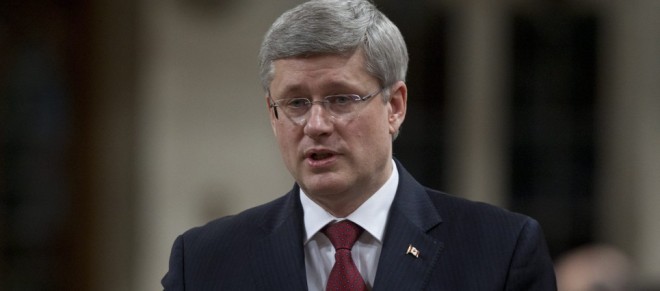The Commons: Having it both ways
Stephen Harper promises his “major transformations” will also be unremarkable
Canadian Prime Minister Stephen Harper responds to a question during Question Period in the House of Commons in Ottawa, Monday January 30, 2012. THE CANADIAN PRESS/Adrian Wyld
Share
 The Scene. For the benefit of the House, Nycole Turmel relayed what she’d taken from what the Prime Minister said last week when he was some 6,264 kilometres from here.
The Scene. For the benefit of the House, Nycole Turmel relayed what she’d taken from what the Prime Minister said last week when he was some 6,264 kilometres from here.
“Mr. Speaker, Canadians are bracing themselves for the deepest round of cuts since Paul Martin, cuts to services Canadians need, like the OAS and EI,” she offered.
Members of the government side audibly whined at this reference to the previous prime minister.
“These cuts will hurt people, hurt seniors, hurt jobs and hurt our communities,” Ms. Turmel continued. “When will the Prime Minister tell Canadians the bad news, on his next trip to Switzerland or somewhere else in the world?”
Last week, so far away from this place, the Prime Minister had been full of dramatic phrasing. “Major transformations,” he said. Demographics posed a “threat” to that which we “cherished.” The deep holes of Europe and the United States threatened to grow deeper. The very future of our society hung in the proverbial balance.
“In every decision, or failure to decide, we are choosing our future right now,” he surmised. “And, as we all know, both from the global crises of the past few years and from past experience in our own countries, easy choices now mean fewer choices later.”
Hearing all this, Ms. Turmel understandably sensed cause for concern. But here Mr. Harper stood, all up-turned-palms and dulcet tones, to assure everyone that nothing too remarkable was in the offing.
“Mr. Speaker, of course,” he began, “this government received a mandate to gradually reduce our deficit to zero. We will do that while protecting the social programs that Canadians cherish. That has been the commitment we have made to the Canadian people. At the same time, we will ensure that our vital programs are sustainable for the long term and for future generations.”
Ms. Turmel was unpersuaded. “Why,” she asked, “does the Prime Minister want to cut Old Age Security benefits?”
The Prime Minister was undaunted. “We do not intend to cut benefits to seniors,” he maintained.
Ms. Turmel suggested this did not answer her question. On the one hand, she said, the government was ready to spend billions on megaprisons and fighter jets. On the other hand, she continued, the government was now ready to cut benefits for seniors.
Mr. Harper suggested that Ms. Turmel did not listen to his answer. “The reality is that we will not cut programs for our seniors,” he said. “At the same time, we will ensure that the retirement income system remains sustainable for future generations.”
One might’ve asked how Mr. Harper squares the second part with the first part, but Peter Julian preferred to press a more straightforward point.
“If the Prime Minister was so concerned about cutting OAS, why did he not say anything about it during the election?” he wondered aloud, daring to stare down Mr. Harper as he finished. “Why did he hide his agenda during the last election campaign?”
On the government’s behalf, Diane Finley insisted on correcting Mr. Julian. “We are not cutting,” she insisted.
A moment later, the interim Liberal leader had his own correction. “Mr. Speaker,” Bob Rae offered, “in fact the Prime Minister did address this question during the election campaign.”
Indeed, Mr. Rae—raising his voice, pointing with his left index finger, then switching to his right—seemed to think he had the Prime Minister pegged. “The Prime Minister stated categorically during the leaders’ debate, he stated it as recently as November, that the government was not going to be touching transfers to individuals and transfers to seniors. He explicitly said that,” Mr. Rae reported. “Now, the minister comes up with the Davos answer. There is an election answer. There is a Davos answer. Which is it? Is the Prime Minister committed to sustaining seniors? Or is he committed to breaking his election promises and breaking faith with the people of Canada? Which is it? Answer the question.”
Mr. Harper attempted to assure his way out of this. “Mr. Speaker, of course, this government ran on very clear commitments and we are acting on those commitments,” he said. “That commitment is to reduce our deficit to zero, gradually, without cutting transfers to individuals or to provinces. That has been very clear.”
Clearly. And yet, Mr. Rae was unsatisfied.
“Mr. Speaker,” the man from the third party charged, “the Prime Minister of Canada cannot have it both ways.”
Mr. Rae underestimates the Prime Minister at his peril.
The Stats. Pensions, 13 questions. Aboriginal affairs, five questions. Military procurement, four questions. Crime and employment, three questions each. Health care, the budget, Service Canada and the environment, two questions each. Bilingualism, the seal hunt and Tunisia, one question each.
Stephen Harper and Diane Finley, eight answers each. Julian Fantino, four answers. Tony Clement, Christian Paradis, John Duncan and Rob Nicholson, three answers each. Leona Aglukkaq and Joe Oliver, two answers each. Ted Menzies, Peter Penashue and Deepak Obhrai, one answer each.